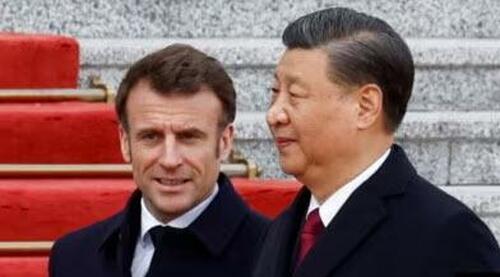Economics
France Has Already Surrendered To The Coming Conflict
France Has Already Surrendered To The Coming Conflict
By Michael Every of Rabobank
De Gaulle of the man!
Good Friday’s slightly stronger-than-expected…

France Has Already Surrendered To The Coming Conflict
By Michael Every of Rabobank
De Gaulle of the man!
Good Friday’s slightly stronger-than-expected US payrolls print saw the market reprice in a further 25bps rate Fed hike in May, albeit not stopping the meme that we are close to the cycle peak. Indeed, new BOJ Governor Ueda just provided no sign he is set to tighten policy, while the Aussie financial press ask ‘Is the RBA a dove or a chicken?’, noting Governor Lowe’s only justification for an April pause was “We’ve already done a lot, let’s pray it’s enough,” and that he’s said he’s “prepared to have a slightly slower return of inflation to target than other central banks… to preserve many of those job gains that have been delivered in the last few years, that’s a better outcome.” As Ben Picton points out, the RBA even has the gall to assume productivity rises ahead to counter low inflation. In short, the white flag is being waved in two places, but not the US.
Make that three, as the IMF’s latest World Economic Outlook expects a return to ultra-low interest rates, with Fed Funds back comfortably below 1%. That’s a big call with struggling supply chains, overheating services, an ageing population acting as a secular push on wage rates, the Wall Street Journal saying ‘The US is back in the factory business’, a return to industrial policy –and mercantilism– and the Fund not even calling for a global recession first! And let’s not forget the global angle, as some EM think about barter not dollars, OPEC+ slash output, and money waits in the wings to leap back into speculative commodity trades again.
Actually, make that four white flags. President Macron’s red-carpet visit to China, where VDL was ushered in via the tradesman’s entrance, saw another big meeting at a big table –with ‘random’ Chinese citizens cheering Macron, not burning down his favorite restaurant– but mocked by national-security experts as “one of the greatest blunders by a major European power since the end of the Cold War,” because “flattery works”; and ‘to Macron’ is now defined as “to deliberately increase one’s dependency on China whilst lecturing European partners about naivety and the need to boost EU strategic autonomy.”
Indeed, Macron signed many China investment deals, a new Airbus plant, promised Huawei fair treatment, and snubbed VDL’s call for China supply-chain ‘de-risking.’ In doing so, despite saying the use of force to change the Taiwan status quo was “unacceptable,” Macron implied no French economic consequences for China, even adding, “I am neither Taiwan nor the US.” While he was there, Beijing said it would inspect cargo vessels entering Taiwan and stepped up major military exercises encircling it, seen as a warm-up for a potential blockade by some in uniform. Today, by contrast, the FT argues ‘Why Taiwan matters to the world: a dangerous rise in tensions with Beijing is a price worth paying to protect a flourishing Asian democracy.’
Monday then saw a Politico story with Macron quotes the site had to stress: “were all actually said by the president, but some parts of the interview in which the president spoke even more frankly about Taiwan and Europe’s strategic autonomy were cut out by the Elysée.” What they could report was Macron stating: “Europe must resist pressure to become America’s followers”; the “great risk” Europe faces is getting “caught up in crises that are not ours, which prevents it from building its strategic autonomy”; Europe had increased its dependency on the US for weapons and energy, and must focus on boosting its defence industries; and the EU should reduce its dependence on the “extraterritoriality of the US dollar,” because “If the tensions between the two superpowers heat up … we won’t have the time nor the resources to finance our strategic autonomy and we will become vassals.” De Gaulle of the man!
National-security experts stress Macron sent the wrong signal to China, as with Russia in 2022, with whom he is still keen to make a deal: imagine if the US had said Ukraine was “a faraway country of which we know nothing,” leaving the EU on their own – which some Americans wish they had. Equally, the EU is divided. France, Germany, and Spain want to deepen relations with China, while those east of Austria and north of Germany (and the Dutch) are looking to the US. This could threaten a schism given national-security nerves now transcend economics. Moreover, Macron is far too late in his warnings. As we argued in ‘Balance of payments –and power– crises’, Europe is already in a structurally weak, EM-like position in a raw ‘geopolitical’ world:
- China is the EU’s largest trading partner, but the EU exports twice as much to the US, while Chinese exports to it hit EU industry; the EU is still negotiating entry for its green goods into the US IRA, i.e., US taxpayers subsidising EU production.
- US sanctions could follow. With US Treasury officials saying ‘America has a message for countries and companies still doing businesses with Russia: You’re with us or against us’, the same could perhaps apply to Europe vis-à-vis China: Airbus could suffer like French automakers in the Iranian market. After all, Foreign Policy magazine argues: ‘The US Needs an Economic War Council for China: If Washington wants peace in Asia, it must prepare for financial war.’
- The EU is reliant on US defence. Building a real EU military means retooling its political economy, massive fiscal expenditure, and a population willing to fight – as Germany’s promised rearmament is now seen taking 50 years. Meanwhile, rising US voices would be happy to stop defending Europe tomorrow to pivot to Asia.
- The EU is reliant on US gas until 2027, and then on the US keeping sea lanes open for Mid-East energy cargoes. It has few green resources or willingness to mine them because it’s so dirty; it can’t go nuclear for a decade or more; wind or solar mean more Chinese goods, or US IRA rivals, and requires rewiring the electricity grid; and new green technology is unproven at scale.
- There is no global alternative to the US dollar, just fragmentation and chaos. The next time France needs Eurodollar swaplines from the US, which more hikes from the Fed increases the likelihood of, will the White House say, “Le service n’est pas compris”?
- As global influence matters for defence, energy, and trade, Asia sees France as following its own interests; and Africa and Latin America see Europe as hypocrites for trying to force them to condemn Russia’s invasion –which has nothing to do with them– while kowtowing.
Meanwhile, Stephen Roach, among the most optimistic and pro-China voices in markets, just published ‘Beijing’s Grim Sense of Resignation’, which has remarkable quotes too:
“For the broad consensus of Chinese I met with during my March 23-28 visit to Beijing, the air was heavy with a grim sense of resignation over the US-China conflict… The China consensus now believes that there is very little that can be done to arrest this worrisome downward spiral in the world’s most important bilateral relationship. But resignation speaks to a different dimension of conflict – the acceptance that it is here to stay and that there is very little that can be done to arrest the escalation, let alone find a path to conflict resolution.… I am left with the uncomfortable sense that the Chinese leadership is now struggling to reconcile its core goals of prosperity and global stature with the mounting conflict with the US. In doing so, they are all but dismissing an important trade-off between conflict and prosperity… There is, of course, a dark side to resignation — of a China that has given up hope and is now preparing for a far more dangerous phase of conflict escalation– kinetic military action. Fortunately, I didn’t pick up any such sentiment on my recent trip in Beijing. But just the thought, reinforced by the recent bellicosity on the US Congress, adds to the lingering sleep deprivation of jet lag.”
That’s worth noting – as is France already surrendering. Indeed, Roach, Macron, the RBA, and the IMF all suggest we are heading for different, but equally painful, episodes of De Gaulle stones.
Tyler Durden
Tue, 04/11/2023 – 08:49
dollar
inflation
commodity
markets
policy
interest rates
fed
us dollar

Argentina Is One of the Most Regulated Countries in the World
In the coming days and weeks, we can expect further, far‐reaching reform proposals that will go through the Argentine congress.
Crypto, Crude, & Crap Stocks Rally As Yield Curve Steepens, Rate-Cut Hopes Soar
Crypto, Crude, & Crap Stocks Rally As Yield Curve Steepens, Rate-Cut Hopes Soar
A weird week of macro data – strong jobless claims but…
Fed Pivot: A Blend of Confidence and Folly
Fed Pivot: Charting a New Course in Economic Strategy Dec 22, 2023 Introduction In the dynamic world of economics, the Federal Reserve, the central bank…




















